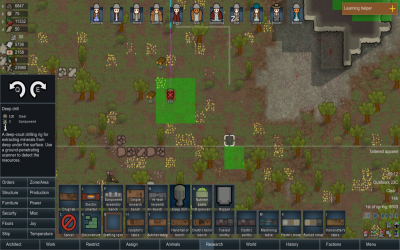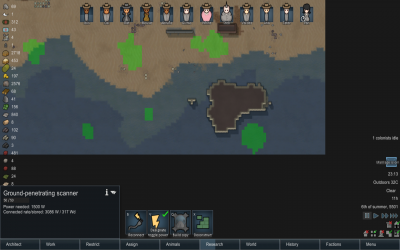Difference between revisions of "Deep drill"
(→Analysis: unstub) |
|||
| Line 82: | Line 82: | ||
Compared to drilling, it is ''much'' faster to mine ores with a long-range scanner. While the long-range scanner finds ore roughly {{ticks/gametime|60000}} slower, you can search for a specific ore like plasteel or gold. It is possible for the ground scanner to find ore at the edges of the map, forcing massive travel times and making the ore deposit impractical. | Compared to drilling, it is ''much'' faster to mine ores with a long-range scanner. While the long-range scanner finds ore roughly {{ticks/gametime|60000}} slower, you can search for a specific ore like plasteel or gold. It is possible for the ground scanner to find ore at the edges of the map, forcing massive travel times and making the ore deposit impractical. | ||
| − | The benefit of deep drilling is ease of use. Ground-penetrating scanners find much more ore (9000 vs 2300 [[steel]]) per deposit. Deep drilling allows your miners to stay within your colony. In contrast, the long-range scanner forces you travel to the destination, fight ambushes, and bring oft-heavy ores back. While drilling is slow, you can have multiple miners operate multiple deep drills. So, overall, drilling operations are a way for lategame and endgame colonies to accumulate resources. Long-range scanners are better if you need a specific ore quickly. | + | The benefit of deep drilling is ease of use. Ground-penetrating scanners find much more ore (9000 vs 2300 [[steel]]) per deposit. Deep drilling allows your miners to stay within your colony. In contrast, the long-range scanner forces you travel to the destination, fight ambushes, and bring oft-heavy ores back. While drilling is slow, you can have multiple miners operate multiple deep drills. |
| + | |||
| + | So, overall, drilling operations are a way for lategame and endgame colonies to accumulate resources. Long-range scanners are better if you need a specific ore quickly. The bottleneck with ground-penetrating scanners, most often, are miners. The bottleneck with long-range scanners is often the scanning and travel time; 1 good miner is sufficient to mine a single ore scan. | ||
== Version history == | == Version history == | ||
Revision as of 19:37, 11 February 2023
| This page could use some more or updated images. You can help RimWorld Wiki by uploading images to make this page better. Note: 1) Extraction radius (see examples in Category:Images - Graphics e.g. File:Skip shield radius.jpg) 2) Deposits. |
Deep drill
A deep-crust drilling rig for extracting minerals from deep under the surface. Use a ground-penetrating scanner to detect the resources. This drill will yield stone chunks if no resources are present. Can be repositioned freely.
Base Stats
- Type
- Building – Production
- Mass
- 35 kg
- Beauty
- -25
- HP
- 300
- Flammability
- 50%
- Path Cost
- 50 (21%)
Building
- Size
- 1 × 1
- Minifiable
- True
- Placeable
- True
- Passability
- pass through only
- Cover Effectiveness
- 50%
- Terrain Affordance
- Light
- Power
- -200 W
Creation
- Required Research
- Deep drilling
- Skill Required
- Construction 4
- Work To Make
- 10,000 ticks (2.78 mins)
A deep drill extracts resources, such as metals or rock chunks, from underground deposits.
Acquisition
| This section is a stub. You can help RimWorld Wiki by expanding it. Reason: Are they ever found in mining camps like the scanners?. |
Deep drills can be constructed once the Deep drilling research project has been completed. They require ![]() 100 Steel,
100 Steel, ![]() 2 Components and 10,000 ticks (2.78 mins) of work.
2 Components and 10,000 ticks (2.78 mins) of work.
Summary
A deep drill takes 200 W of power and occupies a 1x2 cell space, 1 for the drill and 1 for the interaction spot. Deep drills can be uninstalled freely.
A deep drill can mine ore deposits found by ground-penetrating scanner. Otherwise, drills default to producing stone chunks from the map's available stone types. Drills placed on ice, predominantly found in the ice sheet and sea ice biomes, will not produce stone chunks, though ore deposits can be scanned, accessed, and mined as usual.
Operation requires a pawn capable of mining. Each extraction cycle requires 14,000 ticks (3.89 mins) of work to finish, modified by the colonist's Deep Drilling Speed stat, and unaffected by the resource type being mined. Unlike at most production stations, pawns using a deep drill will not sit and gain comfort from a chair positioned at their working spot. Tunneler mechanoids ![]() are unable to use a deep drill.
are unable to use a deep drill.
Ores
A ground-penetrating scanner can be used to create ore deposits. Deep drills will mine ore deposits in a 2-tile radius, or 5-tile diameter. While drills can't be placed in water, walls, or other invalid terrain, a nearby drill can still mine ores within those tiles.
| Resource | Deposit Size | Deposit Mean | Commonality | Resources per cycle |
|---|---|---|---|---|
| 20 - 40 | ~ 30 | 4 | 35 | |
| 7 - 20 | ~ 14 | 0.5 | 40 | |
| 2 - 10 | ~ 7 | 1 | 7 | |
| 1 - 5 | ~ 3 | 0.5 | 10 | |
| 4 - 10 | ~ 7 | 1 | 10 |
The drill's inspection pane shows what resource is below (bioferrite, gold, plasteel, silver, steel, uranium, or jade). Cells will turn from green to yellow and then blank as they are depleted. Each cell contains a total of 300 resources, but the actual number obtained depends on the miner's mining yield, so the values may be slightly lower. When the drill runs out of ores, the building is automatically forbidden, though you can unforbid it to mine stone chunks as usual.
Infestations
Manned drills are capable of drilling into underground insect hives, activating the event Too Deep: Infestation and bringing several insects to the surface. There will be a short delay between the alert and their appearance, giving your miner time to get away.
Analysis
When combined with ground-penetrating scanners, deep drills are a vast and valuable source of metals. These minerals often limit a colony when it comes to ship building or general advancement. A ground-penetrating scanner can find an infinite amount of veins over time, meaning you don't have to leave your colony or rely on trade to get them. Due to how slow drilling is, you may want to place multiple drills when mining for ore deposits.
As the colonist will often spend long times drilling in a place far away from the base, their Mood will suffer because of the lack of beauty and comfort. A room can be constructed around the drill to mitigate the debuffs, using sculptures to increase room quality.
Power
A deep drill requires power to operate, but ore deposits may be far from your main power grid. A vanometric power cell can power up to 5 drills with no input required. Although it is quite explosive, an unstable power cell![]() is easier to get, and can power 2 drills. A fully charged battery can be re-installed near the drill, providing a little less than 3 days worth of power at a time.
is easier to get, and can power 2 drills. A fully charged battery can be re-installed near the drill, providing a little less than 3 days worth of power at a time.
Comparison to long-range scanners
The long-range mineral scanner can find readily mineable ores on the world map, as opposed to ores that need to be drilled. The long-ranged scanner costs the same research as Deep Drill + Ground Scanner combination, though the former is required to research Starflight Sensors.
Compared to drilling, it is much faster to mine ores with a long-range scanner. While the long-range scanner finds ore roughly 60,000 ticks (24 in-game hours) slower, you can search for a specific ore like plasteel or gold. It is possible for the ground scanner to find ore at the edges of the map, forcing massive travel times and making the ore deposit impractical.
The benefit of deep drilling is ease of use. Ground-penetrating scanners find much more ore (9000 vs 2300 steel) per deposit. Deep drilling allows your miners to stay within your colony. In contrast, the long-range scanner forces you travel to the destination, fight ambushes, and bring oft-heavy ores back. While drilling is slow, you can have multiple miners operate multiple deep drills.
So, overall, drilling operations are a way for lategame and endgame colonies to accumulate resources. Long-range scanners are better if you need a specific ore quickly. The bottleneck with ground-penetrating scanners, most often, are miners. The bottleneck with long-range scanners is often the scanning and travel time; 1 good miner is sufficient to mine a single ore scan.
Version history
- Beta 19 - Chemfuel can no longer be acquired by drilling.
- Beta 19/ 1.0 - Now costs more and mines slower.
- 1.0 - it is now possible to drill into insectoid hives.
- 1.1.2624 - the area of deep drills has been expanded to become 21 tiles large (5x5 square minus the corners), as opposed to 9 tiles (3x3 square). Its power consumption has also been reduced (300 -> 200W).


